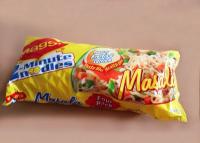Consumer Protection Act
 The Indian government has filed a Rs 640 crore class action on behalf of consumers with the National Consumer Disputes Redressal Commission (NCDRC) against Nestle India under section 12(1D) of the Consumer Protection Act.
The Indian government has filed a Rs 640 crore class action on behalf of consumers with the National Consumer Disputes Redressal Commission (NCDRC) against Nestle India under section 12(1D) of the Consumer Protection Act.
Mumbai lawyer Abhishek Nakashe lodged a police complaint under Section 504 (intentional insult with intent to provoke breach of peace) against local restaurant Secret Spice, after the restaurant entered a heated argument with Nakashe over an allegedly illegally levied service charge in Nakashe’s food bill, reported Midday. Section 504 attracts two years in jail, or a fine, or both.
Under Indian consumer protection laws restaurants have to mandatorily print on their menu all their charges, including the service charge, but Secret Spice, in Mulund, Mumbai had omitted to do so on mention that a service charge was "applicable". Consequently Nakashe objected to the 8 per cent service charge levied on his Rs 525 bill.
“Service charge is a deceptive nomenclature, and rarely do restaurants clarify the per cent levied in their menus, although it is mandated that they do. While I usually pay up when eating out, I decided to take up the issue this time because there was ambiguity in the menu and the management wasn’t forthcoming with an explanation,” Nakashe told Midday.
Service charge is separate from service tax the proceeds from which go to the government. The proceeds from the service charge are distributed between the hotel or restaurant staff after deducting the damages. Consumers argue that menu items are priced to make profits and remunerate staff and the service charge is an unnecessary burden over and above this. Hoteliers argue that the service charge has replaced the generous tips that customers used to offer but have now dried up.
Does the consumer’s right to be heard and redressed really exist in practice? NLSIU Bangalore students find out by using fairness creams, belly fat reduction gels, allegedly 24-hour-effective deodorants, and anti-dandruff shampoos, and then emailing the companies’ customer care departments asking some hard questions.
In their research they conclude that a majority of the departments were unresponsive [Mint]